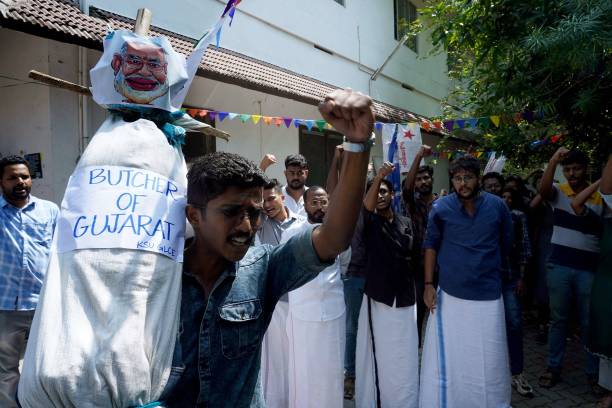India’s Supreme Court to hear appeals against ban on BBC Modi documentary
Film examines Modi’s role in 2002 Gujarat riots where thousands of Muslims were massacred
India’s top court on Monday agreed to hear pleas challenging the ban on a BBC documentary examining prime minister Narendra Modi’s role in the 2002 Gujarat riots.
Titled "India: The Modi Question", the documentary cited a British intelligence report that held Mr Modi “directly responsible” for the Gujarat riots in 2002, where potentially thousands of Muslims were massacred, when he was the state’s chief minister.
Blocking the film soon after its release earlier this month, the government invoked emergency powers under the information and technology law, seeking the removal of clips from social media. The British public broadcaster has been receiving heat from right wing groups in the country after the release of the documentary.
A Supreme Court bench headed by chief justice DY Chandrachud agreed to hear a plea against the government’s decision, listing the matter for 6 February.
New Delhi-based lawyer ML Sharma opposed the government’s move in one of the petitions filed before the court, seeking the quashing of the order, terming it as “illegal, mala fide, arbitrary and unconstitutional”.
In his plea, Mr Sharma also sought examination of the documentary, demanding action against persons who were directly and indirectly responsible for 2002 Gujarat riots. He said that the film contains “recorded facts” which are also “evidence” and can be used to further the cause of justice for the victims.
A separate petition by lawyer Prashant Bhushan, journalist N Ram, and opposition politician Mahua Moitra focused on the government order to take down social media links to the documentary.
In a Twitter comment on the second petition, law minister Kiren Rijiju said: "This is how they waste the precious time of the Honourable Supreme Court, where thousands of common citizens are waiting and seeking dates for justice."
Members of right-wing Hindu Sena put anti-BBC placards outside its India headquarters in New Delhi, accusing the outlet of “tarnishing prime minister’s image” and demanded that the news outlet “leave India”.
National president of the group Vishnu Gupta said: “The BBC is a threat to the unity and integrity of the country and should be banned immediately.”

“BBC has been working to tarnish the image of the country… Now, they are targeting prime minister Narendra Modi,” he was quoted as saying by local media outlets.
Protest against the outlet were also carried out by the Indian diaspora in London, with demonstrators carrying placard reading “You don’t deserve public money”, reported India Today.
The first part of the documentary, released by the BBC for its UK audiences on 17 January, included a previously unpublished report from the UK Foreign Office that held Mr Modi “directly responsible” for the “climate of impunity” that enabled the Gujarat violence to take place.
The riots in February 2002 killed over 1,000 people – most of them Muslims – while Mr Modi was chief minister of Gujarat state.
The violence erupted a day after 59 people, many of them volunteers for Hindu organisations, died on the Sabarmati Express train when their coach was set on fire at Gujarat’s Godhra station.
The Foreign Office report was part of an inquiry ordered by the then foreign secretary Jack Straw.
Mr Modi has denied accusations of any wrongdoing. Suspicions that Modi quietly supported the riots led the US, UK and EU to deny him a visa at the time, a move that has since been reversed.
Last year, a special investigation team appointed by the Supreme Court to investigate the role Mr Modi and other members of his party played in the violence said they found no evidence to prosecute him.
India’s foreign ministry last week called the documentary a “propaganda piece designed to push a particularly discredited narrative” that lacks objectivity and slammed it for “bias” and “a continuing colonial mindset”.
The BBC in a statement said the documentary was “rigorously researched” and involved a wide range of voices and opinions.
“We offered the Indian government a right to reply to the matters raised in the series – it declined to respond,” the statement said.
Join our commenting forum
Join thought-provoking conversations, follow other Independent readers and see their replies
Comments
Bookmark popover
Removed from bookmarks